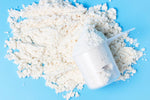
Understanding the Cost of Casein Protein Supplements
, by Sandesh Prasannakumar, 8 min reading time
Stay tuned, Your Favourite supplements will be back in stock soon!
Stay tuned, Your Favourite supplements will be back in stock soon!
Stay tuned, Your Favourite supplements will be back in stock soon!
Stay tuned, Your Favourite supplements will be back in stock soon!
Stay tuned, Your Favourite supplements will be back in stock soon!
Stay tuned, Your Favourite supplements will be back in stock soon!
Stay tuned, Your Favourite supplements will be back in stock soon!
Stay tuned, Your Favourite supplements will be back in stock soon!
Stay tuned, Your Favourite supplements will be back in stock soon!
Stay tuned, Your Favourite supplements will be back in stock soon!

, by Sandesh Prasannakumar, 8 min reading time
In the world of health and fitness, protein supplements are a staple. Among the many types available, casein protein stands out for its unique properties and benefits. However, the cost of casein protein supplements can vary widely, leaving many consumers wondering why. This blog aims to shed light on the factors that influence casein protein prices and help you make informed decisions about your supplement choices.
Casein is a slow-digesting protein found in milk, making up about 80% of its protein content. Unlike whey protein, which is rapidly absorbed by the body, casein forms a gel in the stomach, leading to a prolonged release of amino acids into the bloodstream. This slow digestion rate makes casein ideal for sustained protein delivery, particularly useful for muscle recovery and growth during periods of fasting, such as overnight.
Before delving into the cost factors, it’s essential to understand the different types of casein protein supplements available on the market:
Each type has its unique benefits and price points, which we will explore further.
The primary factor influencing the price of casein protein supplements is the quality of the raw materials. High-quality milk from grass-fed cows tends to be more expensive but offers better nutritional value and fewer contaminants. Products labelled as organic or non-GMO often carry a premium price due to the more stringent farming practices required.
The method used to extract and process casein protein significantly impacts its cost. Micellar casein, for example, involves complex filtration processes to isolate the protein while preserving its natural structure. Casein hydrolysate undergoes further hydrolysis, breaking down the protein into smaller peptides, which increases both the production cost and the final price.
Higher purity and concentration levels generally result in a higher price. Some products boast minimal additives and fillers, offering a more concentrated source of protein. These supplements provide better value in terms of protein content per serving, justifying their higher cost.
Established brands with a track record of quality and efficacy often charge more for their products. Consumers are usually willing to pay a premium for trusted brands that guarantee safety and effectiveness. Marketing, research, and development costs also contribute to the higher prices of reputable brands.
Innovative packaging that ensures product freshness and convenience can add to the cost. Additionally, some casein protein supplements include added ingredients like probiotics, enzymes, or flavourings, which enhance their nutritional profile and taste but also increase the price.
The price of casein protein supplements can range widely, typically from $15 to $50 per pound. Here's a breakdown of what to expect within different price ranges:
Selecting the right casein protein supplement involves considering both your budget and your specific health goals. Here are some tips to help you make the best choice:
Determine why you are taking casein protein. Are you looking for muscle recovery, weight management, or general protein supplementation? Your goals will influence whether you need a basic micellar casein or a more advanced formula with additional benefits.
Look for products with minimal additives and fillers. A shorter ingredient list often indicates a purer product. Avoid supplements with unnecessary artificial sweeteners, colours, or preservatives.
If you have a sensitive stomach, opt for casein hydrolysate or a product with added digestive enzymes. These options are easier on the digestive system and can help prevent discomfort.
Research brands to ensure they adhere to high manufacturing standards and have positive customer reviews. Brands that invest in third-party testing provide an extra layer of assurance regarding the product’s quality and safety.
To get the most out of your investment in casein protein supplements, consider the following tips:
Purchasing larger quantities often reduces the cost per serving. However, ensure that you can consume the product within its shelf life to avoid waste.
Many retailers offer periodic discounts, especially on bulk purchases. Signing up for newsletters or following brands on social media can alert you to sales and special offers.
Sometimes, combining casein with other types of protein, like whey, can provide a balanced amino acid profile and enhance overall benefits. Some products already offer this combination, potentially offering better value.
Understanding the cost of casein protein supplements involves considering several factors, including the quality of raw materials, processing techniques, purity, brand reputation, and additional ingredients. By being aware of these elements, you can make informed decisions that align with your health goals and budget.
Remember, the most expensive option is not always the best, and the cheapest may not offer the desired benefits. Evaluate your needs, research products thoroughly, and choose a casein protein supplement that provides the best balance of quality and cost for you. With this knowledge, you are well-equipped to navigate the diverse market of casein protein supplements and select a product that supports your fitness journey effectively.